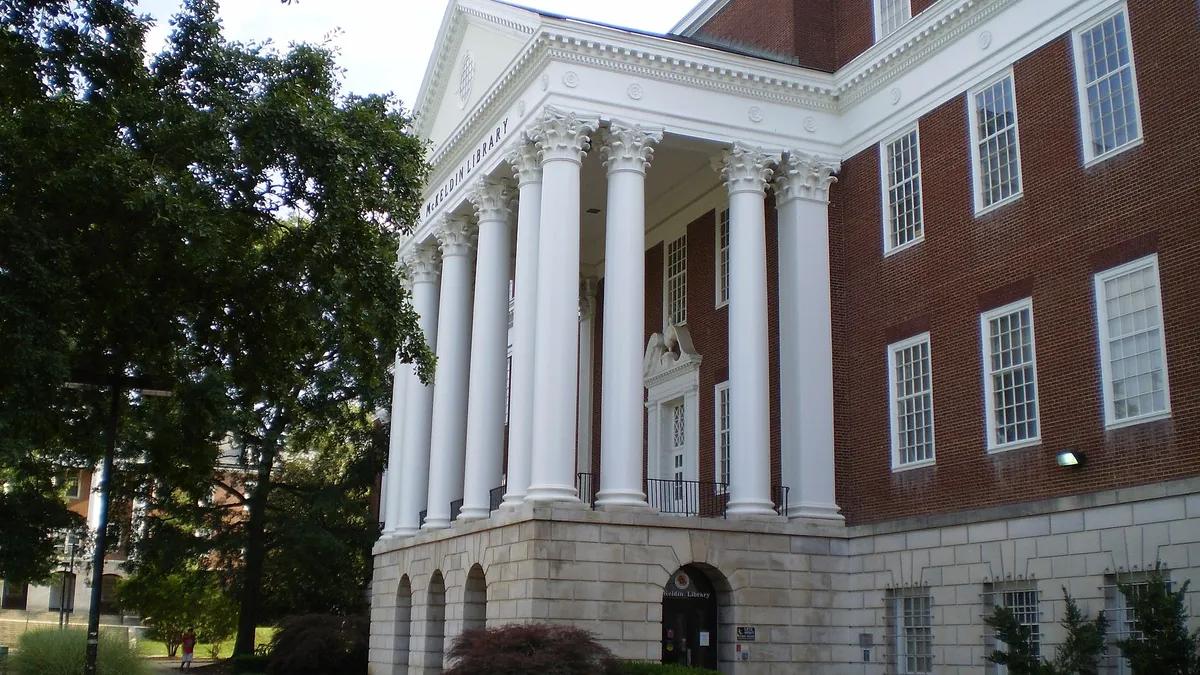Dive Brief:
- The University System of Maryland’s governing board last week voted to remove an admissions requirement that first-year college applicants must submit an SAT or ACT score.
- While the vote removes a systemwide mandate, each institution can decide whether to require entrance exams. No campus president supported keeping standardized testing mandatory across the system at the board of regents’ meeting Friday.
- Several officials raised concerns the tests reinforce discrimination in admissions. SAT and ACT critics have long argued the exams disadvantage low-income and other historically underrepresented populations who cannot afford the same extensive test preparation as their wealthier counterparts.
Dive Insight:
The Maryland system has been test-optional for roughly the past two years because of the pandemic. Institutions across the U.S. dropped testing requirements as a result of the coronavirus spreading through the country and temporarily shutting down common exam sites, such as K-12 schools.
But even as the country began to loosen COVID-19 restrictions, many colleges opted to stick with test-optional policies. More than 1,800 institutions aren’t requiring SAT or ACT scores for fall 2022, according to FairTest, a nonprofit advocating for narrower uses of standardized assessments. FairTest’s count includes colleges that didn’t ask for scores prior to the pandemic.
Some high-profile entities in higher education, such as the University of California and California State systems, have abandoned test scores entirely, and won’t consider them even if applicants submit them. This is known as a test-free or test-blind policy.
The California systems, in making their decisions, in part cited fears the tests favor affluent students who can pay for tutoring. Some critics have argued the SAT and ACT are racist. Testing providers the College Board and ACT maintain they are not prejudicial instruments and can prevent talented students from being overlooked.
Only one institution within the Maryland system, Salisbury University, was test-optional prior to the pandemic. It has used test-optional admissions for about 15 years, its president, Charles Wight, said during Friday’s meeting.
Before the pandemic, 30% of applicants to Salisbury did not submit scores, while 80% did not submit scores during the health crisis, Wight said.
Part of the goal of shifting admissions practices is to gauge how test-optional policies affect incoming classes, said Darryll Pines, president of the University of Maryland, College Park, the state’s flagship institution.
To that end, College Park has decided to remain test-optional through 2027, Pines said during the Friday meeting. He pointed to “cultural bias of the tests,” which he said introduces inequities into the admissions process. Pines also said the university employs a 26-factor admissions system to vet applicants, and the exams have served as only one of those points.
A couple of regents spoke against removing the testing mandate.
Andy Smarick said the system could use standardized exams to root out academic talent among disadvantaged students whose high school records do not reflect their skills.
And Louis Pope expressed concerns that if Maryland system institutions came to rely on high school GPA more heavily in admissions decisions, it would hinder “late bloomers,” whose first- and second-year high school report cards were poor.
Smarick and Pope were the only two regents to vote against dropping the testing requirement.
The policy takes effect immediately.











